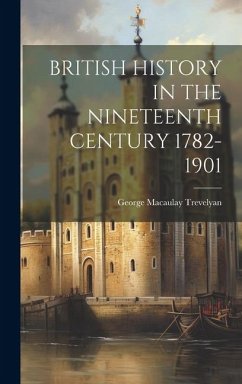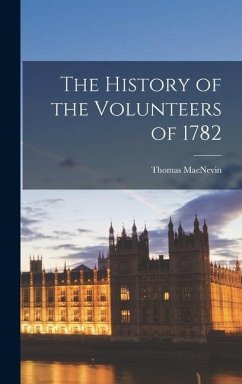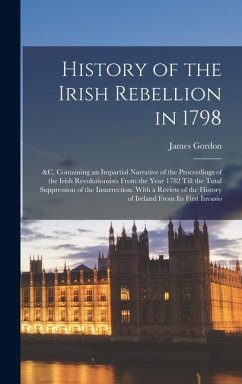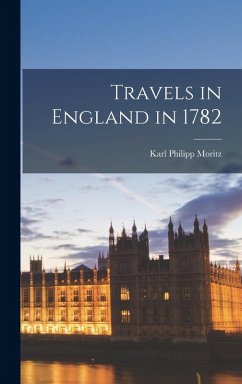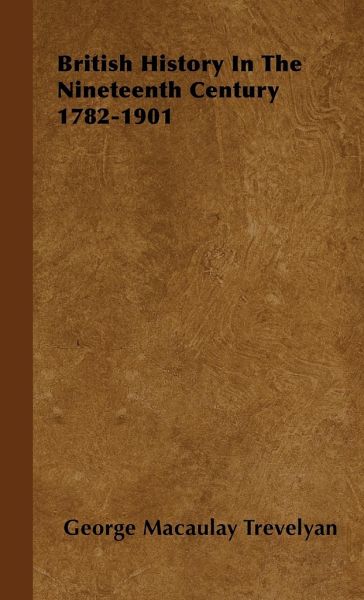
British History In The Nineteenth Century 1782-1901
Versandkostenfrei!
Versandfertig in 1-2 Wochen
39,99 €
inkl. MwSt.
Weitere Ausgaben:

PAYBACK Punkte
20 °P sammeln!
BRITISH HISTORY IN THE NINETEENTH CENTURY ( 1782-1901) by GEORGE MACAULAY. Originally published in 1922. PREFACE: THE object of this book is to enable the student or general reader to obtain, in the compass of one volume, a picture of change and development during the hundred and twenty years when things certainly, and probably men and women with them, were undergoing a more rapid change of character than in any previous epoch of our annals. I have tried to give the sense of continuous growth to show how economic led to social, and social to political change, how the political events reacted o...
BRITISH HISTORY IN THE NINETEENTH CENTURY ( 1782-1901) by GEORGE MACAULAY. Originally published in 1922. PREFACE: THE object of this book is to enable the student or general reader to obtain, in the compass of one volume, a picture of change and development during the hundred and twenty years when things certainly, and probably men and women with them, were undergoing a more rapid change of character than in any previous epoch of our annals. I have tried to give the sense of continuous growth to show how economic led to social, and social to political change, how the political events reacted on the economic and social, and how new thoughts and new ideals accompanied or directed the whole complicated process. For such a purpose, it would be a mistake to confuse the narrative with too much detail, but I have put into the story the main events which directed the course of the current, or were regarded as specially symbolic of each passing age. I cannot hold the epicurean doctrine, sometimes favoured now adays, that because history increasingly deals with generalisation it is safe for the student to neglect dates, which are the bones of historical anatomy. Still less is it safe, in pursuit of generalised truth, to overlook the personality and influence of great men, who are often in large measure the cause of some c tendency which only they rendered inevitable. Political writers, social philosophers and founders of move ments must take their place beside warriors and statesmen in any account of social and political changes in modern times, But religion, literature and science are only mentioned here in connection with social or political developments of which they were in some degree the cause or the symbol. I have made no attempt to appreciate their real significance in a century of British history famous for all three of these supreme efforts of the human spirit. I have called the book British History, because, though it cannot claim to be a History of the Empire, it is more than a History of Britain. It is indeed, mainly, a history of Britain, but it treats of that island as the centre of a great association of peoples, enormously increasing in extent during the period under survey. The course of events in Canada, Australasia, Ireland, India and British Africa have been indicated in broken outline. In particular, I have tried to show the relation of the various phases of our home affairs to each of those separate stories of Imperial development, and the effect of politics and persons at home on our relations with Europe and with the United States Where should a British History of the Nineteenth Century begin, and where break off? Clearly it should stop where the nominal century and the reign of Queen Victoria come to an end together. The finish or the Boer War leaves us on the threshold of our own times, which are still too near us to be seen in perspective. Where to begin is perhaps less obvious. It would, I think, be absurd to begin exactly with the new century, with Adding ton and the Treaty of Amiens, at a moment s pause in ^ the battle with revolutionary France, and in the most terrible years of the initial agony of our own Industrial Revolution. It is necessary first to describe the starting-point of this great era of change, to give a sketch of the quiet, old ^ England of the eighteenth century before machines destroyed it, and the poli tical scene before the French Revolution came to disturb it. The fifty years that stretch from the loss of the American Colonies and the fall of George Ill s personal government down to Lord Grey s Reform Bill, compose a single epochs n our political hi



